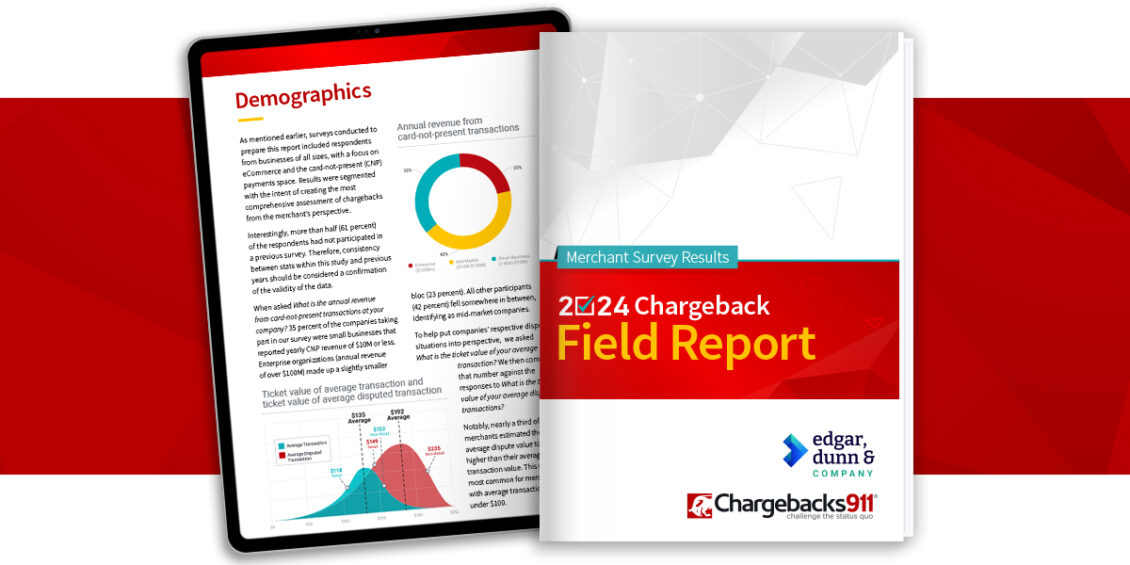
Every year, out team at Chargebacks911 conducts an in-depth survey of merchants operating in the North American market.
We ask a variety of questions, all aimed at putting together a dynamic, insightful, and thought-provoking study that gets at some of the key pain points that merchants face, as well as opportunities to address those pain points. We parse the data, hoping to spot developing trends that may signal a sea change in the payment space.
And, I’m pleased to announce that the latest version of this study — the 2024 Chargeback Field Report — is now available!
This year, we worked with Edgar, Dunn & Company, one of the most respected and visible consulting firms in the global payment space, to conduct the survey and analyze the data. We got responses from nearly 300 retailers, including both small businesses and enterprise merchants, all operating in the North American market. And, based on that survey data, we identified some fascinating data points and trends.
The Current State of Chargebacks & Fraud
With eCommerce sales reaching unprecedented levels, merchants worldwide are experiencing an associated increase in fraudulent disputes initiated by cardholders through card-not-present (CNP) transactions.
Although the chargeback process serves as an essential measure to provide consumer protection, its wrongful exploitation has inflicted significant harm both financially and reputationally on merchants. In the US, the right to dispute transactions is protected by federal law. Unfortunately, our survey results suggest that the majority of customer disputes are actually illegitimate. In fact, major card networks estimate that as much as 70% of all credit card fraud can be traced to chargeback misuse, or ‘friendly fraud,’ an issue that surveyed merchants say has increased nearly 20% over the last three years.
Alarmingly, 53% of cardholders choose to dispute transactions directly through their bank rather than first reaching out to the retailer, thereby depriving merchants of the opportunity to address and settle these disputes directly with their customers. This negative trend is impacting the cost of products and services for consumers, prompting retailers to implement more stringent policies and utilize AI-powered tools to safeguard their revenue.
What Motivates Cardholders To Dispute Transactions?
Between April and June 2024, US retail eCommerce sales surpassed $291 billion, setting a new record for quarterly revenue. but, there are growing concerns among retailers regarding post-purchase threats, such as friendly fraud and refund abuse, expanding alongside online sales. All totaled Mastercard estimated that chargebacks cost merchants approximately $117.47 billion in 2023.
Merchant mistakes continue to be a significant trigger for consumer disputes. This is due, in part, to unclear or unrecognizable billing descriptors, which were identified as the primary cause of chargebacks by surveyed cardholders. Interestingly, a third of merchants reported being unaware of how their billing descriptors appear on customers’ billing statements.
While suspected fraud is a legitimate reason for filing disputes, the primary driver for cardholders to engage with their bank instead of the merchant is convenience, according to the Field Report, with nearly half of respondents citing quick resolution times as their main reason for pursuing chargebacks. Retailers now find themselves in competition with banks, striving to be more accommodating to cardholders.
Chargeback Data is an Invaluable Indicator
Merchants are increasingly relying on machine learning and artificial intelligence as a resource to combat fraud and misuse after transactions. These technologies help in gathering, examining, and responding to transaction data efficiently. Notably, 62% of retailers surveyed indicated they are either currently using (or are intending to implement) AI-driven solutions to detect and manage cases of friendly fraud.
Chargeback data can serve as a powerful KPI, useful for both more accurate decisioning and fine-tuning strategies. It’s worth pointing out that according to our survey, merchants who used a third-party solution or software were twice as likely to know their tracking numbers.
Chargebacks911 suggests that businesses, regardless of their size, should dispute any chargeback that appears to be linked to friendly fraud or misuse by the initial party. According to the report, most retailers participating in the survey confirm the presence of an in-house team specifically assigned to handle chargebacks. However, data reveals that those companies using representment software and services provided by a platform enjoyed a recovery rate over 55% higher compared to those who handled the process on their own.
This is just a small sample of the insights in the full report. Click here to check it out for free!
